Max Pallenberg (1877-1934) was an Austrian singer, actor and comedian. He was one of the most important comedians of his time and often played under the direction of Max Reinhardt. Although Pallenberg was successful as a stage comedian, he only incidentally accepted roles in films.
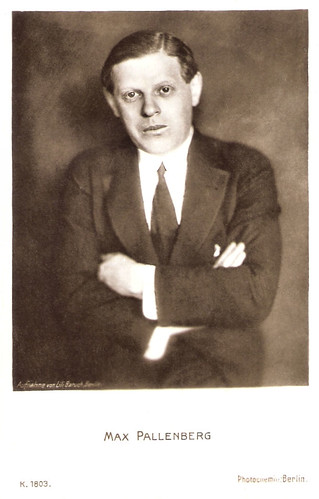
German postcard by Photochemie, Berlin, no. K 1803. Photo: Lili Baruch, Berlin.

German postcard by Photochemie, Berlin, no. K 1806. Photo: Lili Baruch, Berlin.

German postcard by Photochemie, Berlin, no. K 1891. Photo: Lili Baruch, Berlin.
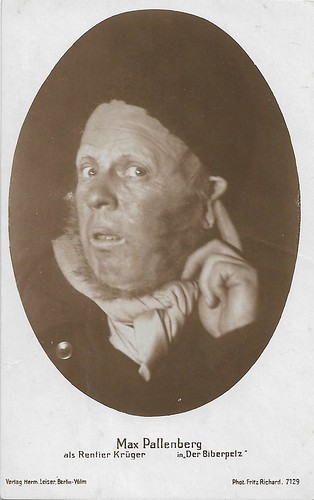
German postcard by Verlag Hermann Leiser, Berlin, no. 7129. Photo: Fritz Richard. Max Pallenberg as Rentier [Reindeer] Krüger in the stage play 'Der Biberpelz' (The beaver fur, 1919).

German postcard by Verlag Hermann Leiser, Berlin-Wilm., no. 1757. Photo: Fritz Richard. Max Pallenberg and Else Lehmann in the stage play Der Biberpelz (1919).

French postcard by Europe, no. 2384. Photo: Emelka. Max Pallenberg in Der brave Sünder / The Upright Sinner (Fritz Kortner, 1931).
Max Pallenberg was born as Max Pollack in 1877 in Vienna, Austria. Max was the son of Markus Pallenberg, who immigrated to Galicia from Vienna, and his wife, Kressel (also Therese) born Korsower.
Pallenberg's career started in 1904, and he played in provincial theatres and with touring companies. In 1908, he joined the then-famous Theater an der Wien as an operetta comedian and sang, inter alia, in the world premiere of Franz Lehár's operetta 'Der Graf von Luxemburg' (The Count of Luxembourg).
In 1910-1911, Pallenberg performed at the Volkstheater in Vienna, and from 1911 on in Munich at the Deutsches Theater. In 1914, he was committed by Max Reinhardt to the Deutsches Theater in Berlin. There, he achieved his artistic breakthrough.
Under the direction of Max Reinhardt, he played brilliant roles such as Schluck in Gerhart Hauptmann's 'Schluck and Jau' and as Peachum in the 'Dreigroschenoper' (Threepenny Opera). Soon, he became one of the most famous character comedians of his time. Pallenberg's stellar role was in Erwin Piscator's dramatic adaptation of Jaroslav Hašek's novel 'Der brave Soldat Schwejk' (The Good Soldier Švejk).
Pallenberg's most important roles at the Salzburg Festival include Mephisto in 'Faust', Argan in Mollière's 'Der eingebildet Kranke' (The Imaginary Invalid), the Devil in 'Jedermann' (Everyman), and Truffaldino in 'Turandot', all directed by Max Reinhardt. In 1917, he married Fritzi Massary, who became one of the operetta divas of the German stage of the 1920s. His first wife had been Betty Franke (1903-1917). They had one child.
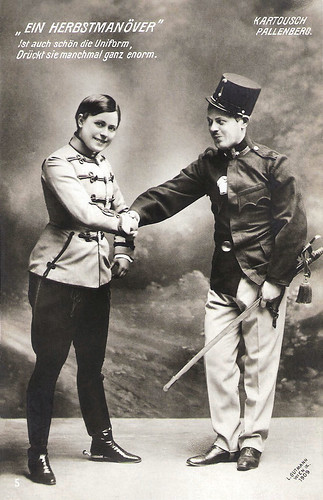
Austrian postcard by B.K.W.I. Photo: Ludwig Gutmann, Wien, 1909. Max Pallenberg and Louise Kartousch in the stage operetta 'Ein Herbstmanöver' (1909). Caption: "Ist auch schön die Uniform, Drückt sie manchmal ganz enorm." (Is also nice the uniform, Sometimes pushes her enormously). 'Ein Herbstmanöver' was the Viennese title of Emmerich Kalman’s first operetta hit, 'Tatájárás', which also launched his Austrian operetta career at Theater an der Wien. 'The Gay Hussars' was the title of the 1909 Broadway version. In 2003, it was recorded at the Ohio Light Opera and released on Albany Records, rechristened 'Autumn Manoeuvres'.

British postcard by Rotary, no. 2701 B. Photo: Hoppe, London. Max Pallenberg as the Spielmann in Max Reinhardt's stage production of 'The Miracle' (1911).

German postcard by Verlag Hermann Leiser, Berlin-Wilm., no. 7398. Photo: Max Pallenberg as Johannes Nepomuk Zawadil in the play 'Die Familie Schimek' by Gustav Kadelburg. In 1916, the play was performed by the Deutsches Theater Berlin under the direction of Emil Jannings.

German postcard by Verlag Hermann Leiser, no. 9273. Photo: Zander & Labisch. Max Pallenberg in Henrik Ibsen's stage play 'John Gabriel Borkmann' (1896).
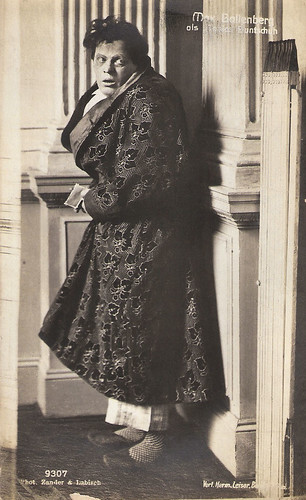
German postcard by Verlag Herm. Leiser, Berlin, no. 9307. Photo: Zander & Labisch. Max Pallenberg in the play 'Tobias Buntschuh' (1917).
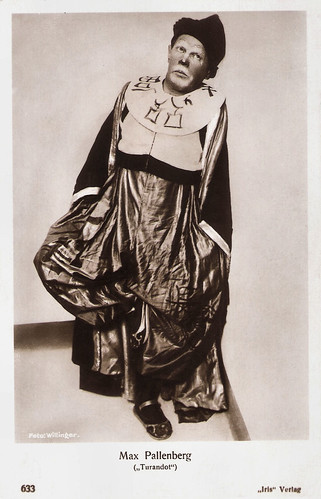
Austrian postcard by Iris Verlag, no. 633. Photo: Laszlo Willinger. Under the direction of Max Reinhardt, Max Pallenberg played Traffaldino in 'Turandot' (1926) by Giacomo Puccini at the Salzburger Festspiele.
Max Pallenberg also starred in several silent and sound films. He made his film debut in the German short Der fidele Bauer - Ich hab mein Zipfelhaubn / The Merry Farmer - I have my Zipfel hood (Franz Glawatsch, 1908) with Wilhelm Binder and Louise Kartousch.
In the early 1910s, he had great success in the cinema with his figure Pampulik and appeared in such Austrian films as Pampulik als Affe / Pampulik as Ape (Alexander Kolowrat, 1912), Pampulik kriegt ein Kind / Pampulik gets a child (Alexander Kolowrat, 1912), and Pampulik hat Hunger / Pampulik is hungry (Alexander Kolowrat, 1913).
During World War I, such films followed as Max und seine zwei Frauen / Max and his two wives (Heinrich Bolten-Baeckers, 1915) with Martha Novelly, Der rasende Roland / The Racing Roland (Heinrich Bolten-Baeckers, 1915) and Kapellmeister Pflegekind / Conductor Pflegekind (Heinrich Bolten-Baeckers, 1915). After the war, he appeared in Die Nacht und der Leichnam / The Night and the Corpse (Adolf Abter, 1921) with Ria Jende.
Pallenberg also appeared in sound films. In Der brave Sünder / The Virtuous Sinner (Fritz Kortner, 1931), he co-starred with Heinz Rühmann. The film is based on the play 'The Embezzlers', which was in turn based on a novel by the Soviet writer Valentin Kataev. Pallenberg had previously rejected all offers to appear in films based on his theatre appearances. He was finally convinced by the producer Arnold Pressburger to try and film one of his stage successes. The film also offered Fritz Kortner a chance to fulfil his ambitions to become a director.
In the 1930s, Max Pallenberg and Fritzi Massary became a butt of the anti-Semitic propaganda of the upcoming Nazis. The Jewish couple went into exile in Austria. A year later, in 1934, Max Pallenberg died in an aeroplane crash near Karlovy Vary (Karlsbad) in today's Czech Republic. He had changed his ticket for the five o'clock flight against a ticket which left Prague already at three o'clock. The five o'clock flight arrived on time, but Pallenberg's flight, however, crashed a few minutes after takeoff. Pallenberg was 56. He was cremated at Feuerhalle Simmering, where his ashes are also buried.
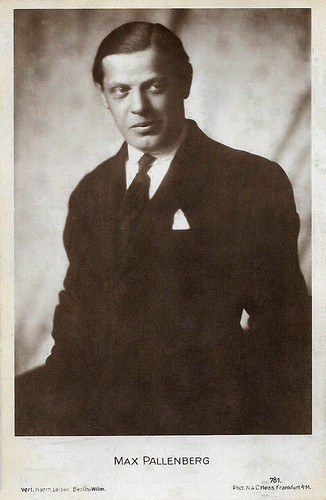
German postcard by Verlag Hermann Leiser, Berlin-Wilm., no. 781. Photo: N. & C. Hess, Frankfurt a.M.
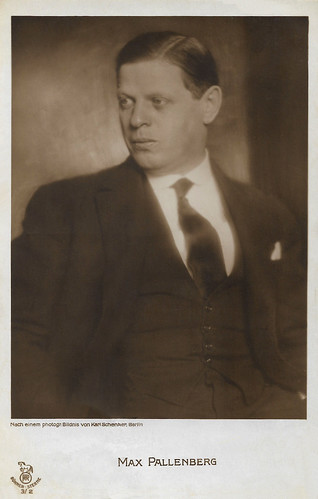
German postcard in the Bühnen-Sterne series by Rotophot, Berlin, no. 3/2. Photo: Karl Schenker, Berlin.

German postcard in the Bühnen-Sterne series by Rotophot, Berlin, no. 3/4. Photo: Karl Schenker, Berlin.

German postcard by Verlag Ross / W.J. Mörlins, Berlin, no. 420/1, 1919-1924. Photo: Karl Schenker.

German postcard by Verlag Ross / W.J. Mörlins, Berlin, no. 420/2, 1919-1924. Photo: Karl Schenker.
Sources: Wikipedia (English and German) and IMDb.
This post was last updated on 25 August 2025.

German postcard by Photochemie, Berlin, no. K 1803. Photo: Lili Baruch, Berlin.

German postcard by Photochemie, Berlin, no. K 1806. Photo: Lili Baruch, Berlin.

German postcard by Photochemie, Berlin, no. K 1891. Photo: Lili Baruch, Berlin.

German postcard by Verlag Hermann Leiser, Berlin, no. 7129. Photo: Fritz Richard. Max Pallenberg as Rentier [Reindeer] Krüger in the stage play 'Der Biberpelz' (The beaver fur, 1919).

German postcard by Verlag Hermann Leiser, Berlin-Wilm., no. 1757. Photo: Fritz Richard. Max Pallenberg and Else Lehmann in the stage play Der Biberpelz (1919).

French postcard by Europe, no. 2384. Photo: Emelka. Max Pallenberg in Der brave Sünder / The Upright Sinner (Fritz Kortner, 1931).
The good soldier Švejk
Max Pallenberg was born as Max Pollack in 1877 in Vienna, Austria. Max was the son of Markus Pallenberg, who immigrated to Galicia from Vienna, and his wife, Kressel (also Therese) born Korsower.
Pallenberg's career started in 1904, and he played in provincial theatres and with touring companies. In 1908, he joined the then-famous Theater an der Wien as an operetta comedian and sang, inter alia, in the world premiere of Franz Lehár's operetta 'Der Graf von Luxemburg' (The Count of Luxembourg).
In 1910-1911, Pallenberg performed at the Volkstheater in Vienna, and from 1911 on in Munich at the Deutsches Theater. In 1914, he was committed by Max Reinhardt to the Deutsches Theater in Berlin. There, he achieved his artistic breakthrough.
Under the direction of Max Reinhardt, he played brilliant roles such as Schluck in Gerhart Hauptmann's 'Schluck and Jau' and as Peachum in the 'Dreigroschenoper' (Threepenny Opera). Soon, he became one of the most famous character comedians of his time. Pallenberg's stellar role was in Erwin Piscator's dramatic adaptation of Jaroslav Hašek's novel 'Der brave Soldat Schwejk' (The Good Soldier Švejk).
Pallenberg's most important roles at the Salzburg Festival include Mephisto in 'Faust', Argan in Mollière's 'Der eingebildet Kranke' (The Imaginary Invalid), the Devil in 'Jedermann' (Everyman), and Truffaldino in 'Turandot', all directed by Max Reinhardt. In 1917, he married Fritzi Massary, who became one of the operetta divas of the German stage of the 1920s. His first wife had been Betty Franke (1903-1917). They had one child.

Austrian postcard by B.K.W.I. Photo: Ludwig Gutmann, Wien, 1909. Max Pallenberg and Louise Kartousch in the stage operetta 'Ein Herbstmanöver' (1909). Caption: "Ist auch schön die Uniform, Drückt sie manchmal ganz enorm." (Is also nice the uniform, Sometimes pushes her enormously). 'Ein Herbstmanöver' was the Viennese title of Emmerich Kalman’s first operetta hit, 'Tatájárás', which also launched his Austrian operetta career at Theater an der Wien. 'The Gay Hussars' was the title of the 1909 Broadway version. In 2003, it was recorded at the Ohio Light Opera and released on Albany Records, rechristened 'Autumn Manoeuvres'.

British postcard by Rotary, no. 2701 B. Photo: Hoppe, London. Max Pallenberg as the Spielmann in Max Reinhardt's stage production of 'The Miracle' (1911).

German postcard by Verlag Hermann Leiser, Berlin-Wilm., no. 7398. Photo: Max Pallenberg as Johannes Nepomuk Zawadil in the play 'Die Familie Schimek' by Gustav Kadelburg. In 1916, the play was performed by the Deutsches Theater Berlin under the direction of Emil Jannings.

German postcard by Verlag Hermann Leiser, no. 9273. Photo: Zander & Labisch. Max Pallenberg in Henrik Ibsen's stage play 'John Gabriel Borkmann' (1896).

German postcard by Verlag Herm. Leiser, Berlin, no. 9307. Photo: Zander & Labisch. Max Pallenberg in the play 'Tobias Buntschuh' (1917).

Austrian postcard by Iris Verlag, no. 633. Photo: Laszlo Willinger. Under the direction of Max Reinhardt, Max Pallenberg played Traffaldino in 'Turandot' (1926) by Giacomo Puccini at the Salzburger Festspiele.
A butt of anti-semitic propaganda
Max Pallenberg also starred in several silent and sound films. He made his film debut in the German short Der fidele Bauer - Ich hab mein Zipfelhaubn / The Merry Farmer - I have my Zipfel hood (Franz Glawatsch, 1908) with Wilhelm Binder and Louise Kartousch.
In the early 1910s, he had great success in the cinema with his figure Pampulik and appeared in such Austrian films as Pampulik als Affe / Pampulik as Ape (Alexander Kolowrat, 1912), Pampulik kriegt ein Kind / Pampulik gets a child (Alexander Kolowrat, 1912), and Pampulik hat Hunger / Pampulik is hungry (Alexander Kolowrat, 1913).
During World War I, such films followed as Max und seine zwei Frauen / Max and his two wives (Heinrich Bolten-Baeckers, 1915) with Martha Novelly, Der rasende Roland / The Racing Roland (Heinrich Bolten-Baeckers, 1915) and Kapellmeister Pflegekind / Conductor Pflegekind (Heinrich Bolten-Baeckers, 1915). After the war, he appeared in Die Nacht und der Leichnam / The Night and the Corpse (Adolf Abter, 1921) with Ria Jende.
Pallenberg also appeared in sound films. In Der brave Sünder / The Virtuous Sinner (Fritz Kortner, 1931), he co-starred with Heinz Rühmann. The film is based on the play 'The Embezzlers', which was in turn based on a novel by the Soviet writer Valentin Kataev. Pallenberg had previously rejected all offers to appear in films based on his theatre appearances. He was finally convinced by the producer Arnold Pressburger to try and film one of his stage successes. The film also offered Fritz Kortner a chance to fulfil his ambitions to become a director.
In the 1930s, Max Pallenberg and Fritzi Massary became a butt of the anti-Semitic propaganda of the upcoming Nazis. The Jewish couple went into exile in Austria. A year later, in 1934, Max Pallenberg died in an aeroplane crash near Karlovy Vary (Karlsbad) in today's Czech Republic. He had changed his ticket for the five o'clock flight against a ticket which left Prague already at three o'clock. The five o'clock flight arrived on time, but Pallenberg's flight, however, crashed a few minutes after takeoff. Pallenberg was 56. He was cremated at Feuerhalle Simmering, where his ashes are also buried.

German postcard by Verlag Hermann Leiser, Berlin-Wilm., no. 781. Photo: N. & C. Hess, Frankfurt a.M.

German postcard in the Bühnen-Sterne series by Rotophot, Berlin, no. 3/2. Photo: Karl Schenker, Berlin.

German postcard in the Bühnen-Sterne series by Rotophot, Berlin, no. 3/4. Photo: Karl Schenker, Berlin.

German postcard by Verlag Ross / W.J. Mörlins, Berlin, no. 420/1, 1919-1924. Photo: Karl Schenker.

German postcard by Verlag Ross / W.J. Mörlins, Berlin, no. 420/2, 1919-1924. Photo: Karl Schenker.
Sources: Wikipedia (English and German) and IMDb.
This post was last updated on 25 August 2025.
No comments:
Post a Comment